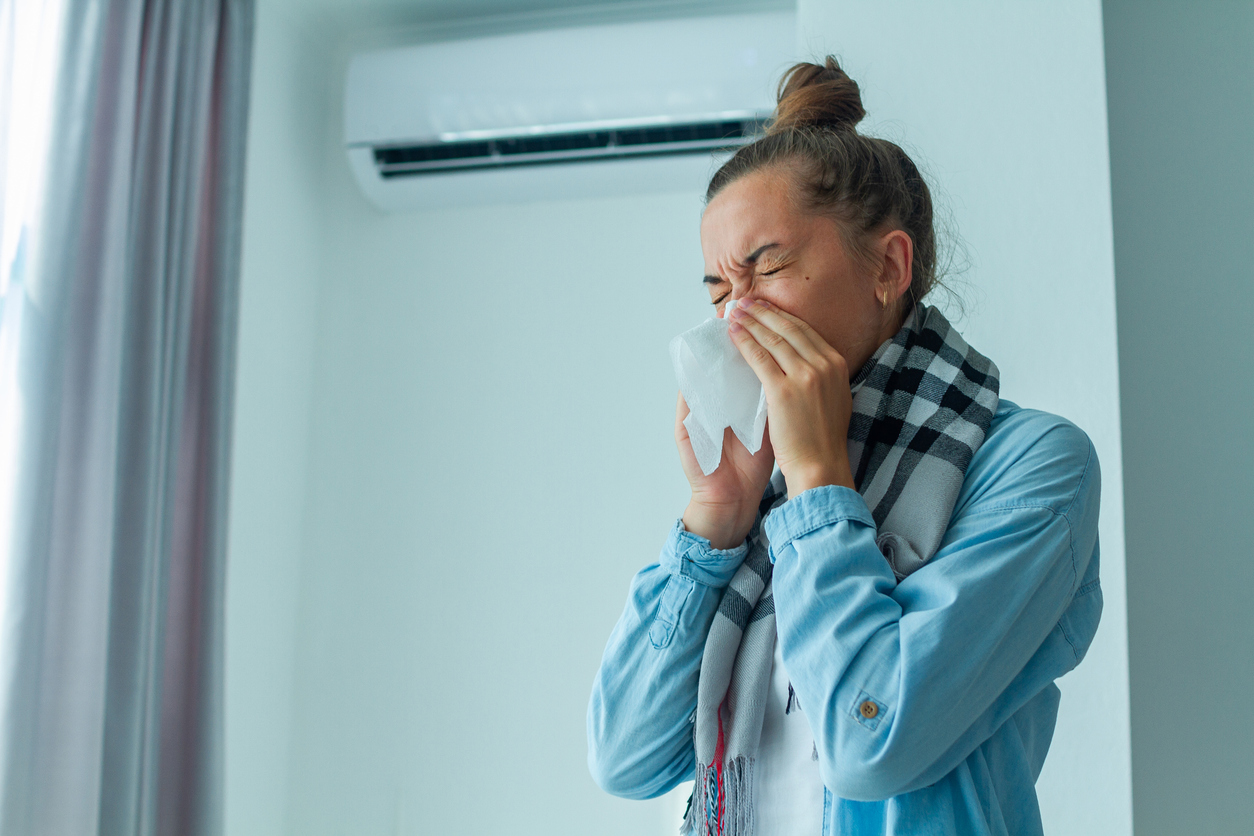Many people notice their allergies worsen when they turn on their air conditioner in the summertime. This leaves them wondering: "Can you be allergic to air conditioning?" The short answer is no— you can't be allergic to the cool air itself. However, your AC system might be making your allergies worse.
In this blog, we'll explore the connection between air conditioning and allergies. Continue reading to learn why you might notice increased allergy symptoms when you switch on the AC.
Why Your AC Might Cause Allergy Symptoms
Your air conditioner doesn't cause allergies directly. However, it can spread allergens around that are already in your home.
When your AC runs, it pulls air through its system and blows conditioned air back into your living areas. If dust, pollen, mold, or pet dander are in your home or in the AC system itself, these particles get blown throughout your house.
Many people mistake their reaction to airborne allergens as an allergic reaction to the air conditioning unit. What's really happening is that your AC is simply kicking up existing pollutants that trigger your symptoms.
Common Signs of AC-Related Allergies
We now know that air conditioning doesn't cause allergies. However, how do you know if AC is affecting your allergies at all?
Watch for these symptoms (or an increase in symptoms) when your AC is running:
- Sneezing
- Runny or stuffy nose
- Itchy or watery eyes
- Scratchy throat
- Coughing
- Worsening asthma symptoms
- Headaches
- Skin irritation
If these symptoms get better when you're away from home or when the AC is off, your air conditioning system might be the culprit.
What Causes an Allergic Reaction When the Air Conditioning Is Running?
Several problems can turn your AC into an allergy trigger:
Dirty Air Conditioner Filters
The most common cause of AC allergy symptoms is a dirty filter. When air filters get clogged, they can't trap allergens effectively. Instead, your system blows these irritants back into your home. You should change your HVAC filter every 1-3 months, depending on your filter type and home environment.
Dust Mites
These tiny bugs feed on the dust in your home and can trigger strong allergic reactions. Your air conditioning system can spread dust to new areas, creating more feeding spots for dust mites. As these creatures multiply, they leave behind waste that triggers allergies.
Mold Growth
Air conditioners create condensation and moisture, perfect conditions for mold growth. When mold grows in your AC system, it releases spores into the air. These spores can trigger severe allergic reactions in sensitive people.
If there are issues with ventilation or your AC system isn't well-maintained, mold growth is more likely to occur. Your HVAC system could also spread mold spores if there is an area harboring mold in your home, such as a laundry room or bathroom.
Pet Dander
Your AC system can spread pet hair and dander throughout your home by carrying it through the air vents. This means you might experience allergy symptoms even in rooms your pets never enter.
Outdoor Allergens
Allergens from outside can enter your home anytime you open a door or window. This means seasonal pollen and other outdoor allergens can get sucked into your AC system and dispersed throughout your living areas.
Temperature and Humidity Level Changes
Cold, dry air from AC can trigger allergy-like symptoms. This may lead to temporary congestion or a runny nose. Sudden shifts between warm outdoor air and cold indoor environments can also shock nasal passages, exacerbating symptoms.
How To Avoid AC Allergies
You don't have to choose between staying cool and staying healthy. Here are simple steps to reduce AC-related allergy problems:
- Change or Clean Filters Regularly
Mark your calendar to check your air filters monthly, especially during heavy use. Replace disposable filters or clean reusable ones when they look dirty.
- Schedule Professional AC Maintenance
Annual HVAC tune-ups help catch problems before they affect your system. At Dutch Enterprises, we thoroughly clean key components and check for issues like mold growth or contamination.
- Improve Your Indoor Air Quality With Filtering Equipment
Adding an air purifier to your HVAC system can trap particles that regular filters miss. These systems work alongside your AC unit to clean your air more thoroughly. You can also opt for an air cleaner, air scrubber, or UV light air purifier.
- Keep Indoor Humidity Low
Keeping humidity between 30-50% prevents mold growth in your system and home. Consider a whole-home dehumidifier if you live in Southeast Missouri's humid climate.
- Upgrade Air Filters
Standard filters catch large particles, but upgrading to HEPA filters or electrostatic filters can help eliminate smaller allergens that trigger symptoms.
Call Our Professionals for Maintenance Services
If you've tried these steps but still experience allergic reactions when you use your air conditioner, call Dutch Enterprises. Our experienced technicians can:
- Perform a thorough system cleaning
- Check for hidden mold growth
- Recommend appropriate filtration upgrades
- Provide a complete maintenance tune-up
Don't suffer through another season wondering if you're allergic to AC.
Contact Dutch Enterprises today to schedule a professional AC inspection. Our team has served Southeast Missouri since 1962, helping families breathe easier in their homes. We'll help you enjoy cool, clean air all summer long!



